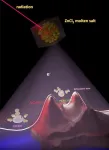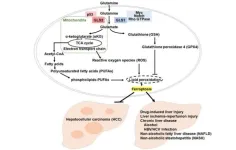MADRID ― The University of Texas MD Anderson Cancer Center’s Research Highlights provides a glimpse into recent basic, translational and clinical cancer research from MD Anderson experts.
This special edition features upcoming oral presentations by MD Anderson researchers at the 2023 European Society for Medical Oncology (ESMO) Congress focused on clinical advances across a variety of cancer types. Highlights include a combination strategy for EGFR-mutant metastatic lung cancer, updated results for a Phase II study on immunotherapy for skin cancer, a promising drug for bile duct cancer, pre-surgical treatment options for resectable melanoma, concurrent intrathecal and intravenous treatment for leptomeningeal disease, a triplet combination for melanoma brain metastases, promising results for an antibody drug conjugate targeting HER2, and the option to eliminate surgery for a subset of breast cancer patients. More information on ESMO content from MD Anderson can be found at MDAnderson.org/ESMO.
In addition to the studies summarized below, forthcoming press releases will feature the following late-breaking and oral presentations:
Results from the Phase III CheckMate 77T study evaluating neoadjuvant nivolumab plus chemotherapy vs. neoadjuvant placebo plus chemotherapy followed by surgery and adjuvant nivolumab for untreated, resectable stage II-IIIB non-small cell lung cancer (Abstract LBA1) Results from the Phase III DUO-E trial for newly diagnosed advanced or recurrent endometrial cancer (Abstract LBA41) Results from the Phase III THOR study on erdafitinib vs. pembrolizumab in pretreated patients with advanced or metastatic urothelial cancer (Abstract 2359O) Subgroups from the Phase III THOR study on erdafitinib vs. chemotherapy in patients with advanced or metastatic urothelial cancer with select FGFR alterations (Abstract 2362MO) Combination treatment prolongs survival in patients with EGFR-mutant lung cancer (Abstract LBA71)
Osimertinib, an EGFR inhibitor, is the current standard first-line treatment for patients with metastatic EGFR-mutant non-small cell lung cancer (NSCLC), yet there is a need to identify improved treatments to enhance its initial efficacy. In the randomized Phase II RAMOSE trial, researchers led by Xiuning Le, M.D., Ph.D., found combining osimertintib with ramucirumab, an anti-VEGF treatment, significantly prolonged progression-free survival (PFS). The median PFS was 24.8 months in the combination arm compared to 15.6 months for those who received osimertintib alone. The combination also demonstrated a favorable safety profile. This study suggests osimertinib plus ramucirumab should be considered as a first-line treatment option for patients with EGFR-mutant metastatic NSCLC. Le will present the updated findings on Oct. 21.
Pre-surgical immunotherapy improves patient outcomes in advanced operable cutaneous squamous cell carcinoma (Abstract 1088MO)
Patients with cutaneous squamous cell carcinoma (CSCC), the second most common form of skin cancer, typically present with early-stage disease that can be treated with surgery alone, though a subset with more advanced disease will require radiation in addition to surgery. In a one year follow-up to a multicenter Phase II study led by Neil D. Gross, M.D., neoadjuvant (pre-surgical) immunotherapy given to patients with advanced resectable CSCC demonstrated favorable survival outcomes with a median follow-up duration of 18.7 months. The study included 79 participants treated with neoadjuvant cemiplimab followed by curative-intent surgery. Based on treatment response, patients were offered up to 48 weeks of adjuvant cemiplimab, radiation therapy or observation only. Estimated 12-month event-free survival was 89%. Notably, none of the 40 patients with a pathological complete response (pCR) experienced recurrence. The results indicate that neoadjuvant cemiplimab followed by surgery is a viable treatment option for advanced, operable CSCC. A Phase III trial is planned to test this novel approach. Gross will present updated findings on Oct. 21.
Tinengotinib delivers promising efficacy in patients with advanced cholangiocarcinoma (Abstract 95MO)
Current FGFR inhibitor (FGFRi) therapies for patients with refractory or relapsed cholangiocarcinoma (CCA), or bile duct cancer, can lead to secondary FGFR2 mutations and treatment resistance. To address this, researchers led by Milind Javle, M.D., evaluated the efficacy and safety of tinengotinib, a next-generation FGFR2 inhibitor with unique target binding to overcome acquired resistance mutations. This Phase II trial enrolled patients who had received at least one prior line of chemotherapy, including those with prior FGFRi therapy. Among 58 evaluable patients, the overall response rate (ORR) was 20.7% and disease control rate (DCR) was 75.9%. Patients with FGFR2 kinase domain mutations had the best ORR at 50%. In patients with FGFR2 alterations who received prior FGFRi, the ORR was 34% and the DCR was 89.7%. For patients who acquired resistance to prior FGFRi treatment, the ORR was 38.1%. The findings suggest tinengotinib may have a potential role in treating CCA patients with FGFR2 fusions, including those with prior FGFRi treatment. These data are based on a limited patient population and need confirmation in a larger cohort. Researchers have launched the Phase III study of tinengotinib to further investigate this therapy. Javle will present the findings on Oct. 21.
Perioperative immunotherapy improved outcomes in patients with late-stage melanoma (Abstract LBA48)
Patients with advanced melanoma face a significant risk of relapse even after surgery. Adding immunotherapy to surgery is considered more effective than surgery alone. In the SWOG S1801 Phase II study, researchers led by Sapna Patel, M.D. demonstrated perioperative (pre- and post-surgery) immunotherapy resulted in better survival than adjuvant (post-operative) immunotherapy alone. A follow-up analysis found more than half of the participants who received perioperative immunotherapy had a major pathological response, meaning there was less than 10% remaining viable tumor after three doses of neoadjuvant (pre-operative) pembrolizumab. These data suggest perioperative pembrolizumab results in favorable tumor changes in a majority of patients. Patel will present the updated findings on Oct. 23.
Intrathecal and intravenous immunotherapy improves survival in patients with leptomeningeal disease (Abstract 1082O)
Leptomeningeal disease (LMD) occurs when cancer cells from tumors migrate into the cerebrospinal fluid (CSF) and leptomeninges, part of the lining of the brain and spinal cord. LMD can be challenging to diagnose and treat, and patients face poor survival rates. A recent proof-of-concept study showed that intrathecal (IT) nivolumab, which is administered directly into the CSF, along with intravenous (IV) immunotherapy helped improve survival in patients with LMD. Building upon this, Isabella Glitza Oliva, M.D., Ph.D., and colleagues continued the combination therapy in an IT dose expansion study. The median overall survival (OS) was 30 weeks, with a landmark OS rate of 68%, 54% and 35% at 13, 26 and 52 weeks, respectively. This study demonstrates the safety and efficacy of this combination of IT and IV therapy among 50 patients treated, confirming its feasibility and supporting ongoing clinical evaluation to further improve outcomes in this underserved patient population. Glitza Oliva will present updated clinical outcomes on Oct. 23.
Triplet combination is safe and demonstrates clinical benefit in patients with refractory melanoma brain metastases (Abstract 1085O)
While many patients with melanoma brain metastases (MBM) respond well to immune checkpoint blockade, many fail to respond or subsequently develop resistance, leaving them with limited systemic treatment options and a poor prognosis. In this Phase II study, a research team led by Elizabeth Burton examined the safety and efficacy of atezolizumab, bevacizumab and cobimetinib in 20 patients with treatment refractory MBM. The intracranial (IC) response rate and IC benefit rate were 39% and 56%, respectively. Safety was consistent with expectations, with 18 patients experiencing treatment-related adverse events (TRAEs) and 7 (35%) experiencing grade 3/4 TRAEs. Although the median PFS was 2.7 months, the median OS was 9.3 months. Seven patients (35%) received treatment beyond progression, including stereotactic radiosurgery, after evaluation by MD Anderson’s multidisciplinary Brain Metastasis Clinic. These results, which highlight the tolerability of the combination, merit further clinical evaluation and underscore the importance of integrating multidisciplinary care into the evaluation of novel therapeutic strategies in this patient population. Burton will present updated findings on Oct. 23.
Primary analysis of Phase II data of trastuzumab deruxtecan continues to show promising signals (Abstract LBA34)
Trastuzumab deruxtecan (T-DXd), an antibody drug conjugate targeting HER2, has been approved for use in HER2-positive breast cancer, gastric cancer and HER2-mutant lung cancer. In the DESTINY-PanTumor02 study led by Funda Meric-Bernstam, M.D., T-DXd also showed potential as a treatment option in several other cancers, especially gynecological cancers. The objective response rate (ORR) across all patients was 37.1% with a duration of response of 11.3 months, but among patients with the highest levels of HER2 expression, ORR was 61.3% with a duration of 22.1 months. These data support the potential role of T-DXd as a tumor-agnostic therapy for patients with hard-to-treat HER2-expressing solid tumors that currently have limited treatment options. Interim data from this trial were presented at the 2023 American Society of Clinical Oncology (ASCO) Annual Meeting. Meric-Bernstam will present the primary analysis on Oct. 23.
Eliminating surgery in select breast cancer patients shows low risk of cancer recurrence (Abstract 243MO)
Approximately 60% of early-stage triple-negative and HER2-positive breast cancers have a positive response to chemotherapy. An exceptional response to chemotherapy is a strong indicator of a favorable prognosis and can be accurately confirmed through a minimally invasive image-guided vacuum-assisted core biopsy (VACB). In a Phase II trial led by Henry Kuerer, M.D., Ph.D., 50 patients underwent a VACB after completing chemotherapy. Previous reports of this research showed no breast cancer recurrence within two years. VACB identified a complete absence of cancer in 31 patients and, over three years, there were no recurrences in the same breast. The three-year disease-free survival and overall survival rates were both 100%. This study suggests that, for carefully selected breast cancer patients, avoiding surgery carries a minimal risk of disease recurrence. Further investigation and clinical trials are essential to validate this approach. Kuerer will present the three-year findings on Oct. 23.
- 30 -
END







